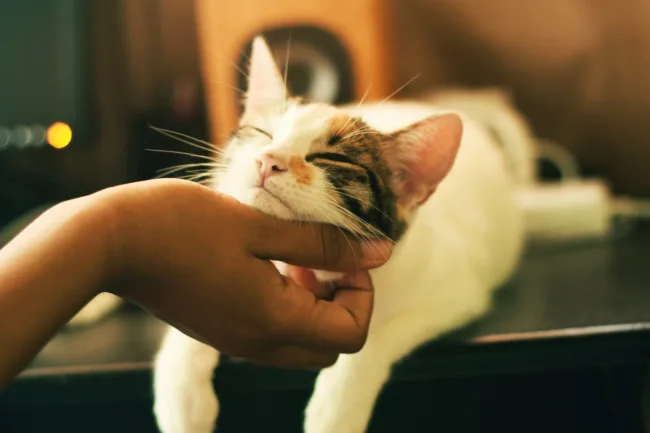You can register your cat as an emotional support animal in a registry, but getting an ESA letter is way more important. An ESA letter from a licensed therapist or doctor is what legally turns your cat into an ESA. After doing that, you can voluntarily register your cat as an ESA, but that extra step is not required, and your landlord can’t force you to do it.
Register Your Emotional Support Cat
Reasons to Register Your Emotional Support Cat
You don’t need to register your cat as an emotional support animal by law, but there are some reasons many ESA owners still do it:
1. Dealing with Landlords
A few landlords insist on seeing proof of registration for ESAs, and some people find that presenting a registration along with their ESA letter can make the accommodation process smoother. It can help to avoid lengthy explanations or misunderstandings, especially if the landlord is unfamiliar with ESA laws. Don’t forget, though, that you can always stand your ground and refuse – landlords are not entitled to see registration proof.
2. Access to Additional Resources
ESA registries often provide access to additional resources, such as ID cards, harnesses, or tags that indicate the animal’s status as an ESA that are linked to a unique registration number. These are used so concierges and neighbors can quickly identify the animals in residential buildings that normally don’t let pets in.
3. Symbolic Value
Some ESA owners want to further document that their cat qualified for an ESA and affirm their bond with their cat and the role they play in their emotional well-being. It’s not an “official” step but can have symbolic value to some to say they have an ESA registered in a publicly searchable database.
The Process to Register an Emotional Support Animal
If you want to register your emotional support cat, here are the steps to do so:
- Talk to your doctor or therapist
Before you can register an ESA or get any other optional ESA perks, you have to actually qualify for one. The first step in that process is to ask your doctor or therapist about whether an emotional support animal is right for you, or better yet, go through ESA Doctors and get it done online.
- Get your ESA Letter
Have your doctor or therapist document your need for an emotional support animal in a signed ESA letter with their licensing information.
- Register your emotional support cat online
If you have your ESA letter, congrats! You’re now officially the owner of an emotional support animal. You can register your ESA in a private emotional support registry and get an ID card. Find an organization that’s been around for a long time and requires you to be qualified for an ESA before you can sign up. If the site hints that you can qualify for an ESA just by registering, stay away!

Qualify for an ESA and register your cat as your emotional support animal
FAQs
There is no official government registry for emotional support cats. Voluntary ESA registries are run by various private organizations.
ESA laws are clear that you do not need any special registration for an emotional support animal. Landlords are frequently mistaken about this. Some ESA owners will obtain registration just to comply, but it is not necessary. An ESA letter is the only proof your landlord can ask for!
ESA registries are run by private organizations, and the cost can vary. Keep in mind that if your finances are in a delicate situation, you don’t need to take the additional step of registration after getting your ESA letter. ESA laws are designed to help you save money by not paying pet related fees and deposits. The cost for an ESA letter can vary, but you can get one online through ESA Doctors for a low flat rate.
No, registering an emotional support cat does not get you any additional legal benefits. You get the legal perks of having an ESA by having an ESA letter that was personally written for you by a therapist or doctor.
If your municipality requires the registration of cats as pets, having ESA status generally does not exempt you. You will still need to register your cat as a pet with your city or county. Many areas do not require the registration or licensing of cats as pets.
Emotional support cats have housing rights protected under federal and state law. You can live with your ESA in no-pet buildings without having to pay pet fees or pet deposits. Emotional support cats are also exempt from weight and breed restrictions.






What if my landlord tries to eviction on me because of my ESA pet cat after I submit the letter to them? By law can they do that to me because I’m worried to submit my ESA to my landlord?
Landlords need to have a specific exemption in order to deny reasonable accommodation for an emotional support animal. Please see this link for more details: https://esadoctors.com/landlord-emotional-support-animal/
Can my cat go with me and not under the seat in an airplane if it’s registered as ESA?
Unfortunately US airlines no longer recognize emotional support animals. To fly with your ESA, it will have to travel under the airline’s normal pet policies which have many limitations regarding the animal’s size, as well as additional fees. The only assistance animals recognized on flights are service dogs. Please see this guide for more details: https://esadoctors.com/fly-with-dog/
I have a letter from a licensed mental health professional. She is licensed in the state that I reside, but she does not have a physical practice in my state since I contact her via telehealth. My apartment complex is denying my request for my ESA due to her not having a physical practice in the state. Is that a valid reason for them to deny my request?
HUD guidelines allow tenants to get ESA letters from remote providers. You may find this article helpful: https://esadoctors.com/can-get-emotional-support-animal-certification-online/
How much does this service cost?
I currently am disabled and suffer with depression and anxiety, I have a cat (8months old) I would definitely say she’s my emotional support animal as she sits and cuddles me when I’m home and it makes me feel wanted. I’m about to be homeless and council are saying I may not be able to take my cat :(
We’re so sorry to hear about the troubles you’re having. Cats are very popular as emotional support animals and can be amazing companions through difficult times. We offer a flat rate service for ESA evaluations and ESA letters. With an ESA letter, you’ll have housing rights for your emotional support cats under Fair Housing rules. You can find specifics about our pricing plan here: https://esadoctors.com/pricing-plan/
I have been tenant for over 30 years and have always had pets here. Currently have 2 cats who are critical to my wellbeing as I suffer from deep ongoing depression. My landlord is aware of both cats and there have never been any complaints. However 2 tenants have moved in with ESA dogs and now my landlord now wants me to register my cats and charge me $500 fee as fee. as well as a high monthly rent. My question is can I register my cats as EMA even after them being in the apartment for years? How could I defend registering them now without mentioning my mental health issues which have worsened with the stress of this issue but I want them to remain strictly private. Please advise.
You never need to “register” an emotional support animal. Many landlords mistakenly make this request without understanding how ESA qualification works. If your building prohibits cats, you should have an ESA letter which will exempt you from those restrictions. The only documentation you need to verify that your cats are emotional support animals is an ESA letter from a licensed healthcare professional. Landlords cannot charge pet deposits or pet rents if the tenant has emotional support cats. If you need our help to qualify for an ESA letter for your cats, please start here: https://esadoctors.com/esa-questionnaire/
Can ESA cat be in a university college?
Generally yes, but we recommend seeing what your university’s specific policies and guidelines are.
Does the housing include overnight hotel stays that do not allow pets?
Unfortunately ESAs do not have legal rights in hotels. Some hotels may accommodate them however as a courtesy. Please see this link for more details: https://esadoctors.com/where-can-i-take-emotional-support-animals/
If we register our esa is there a specific website to go too?
You do not need to register an emotional support animal. You qualify for an ESA by obtaining a letter from a licensed healthcare professional. Please see this article for more info: https://esadoctors.com/register-dog-emotional-support-animal/
If an apartment has a typical monthly fee for cats along with a security deposit. Can you still be charged those fees for an ESA?
No, ESAs are exempt from standard pet fees.
We just relocated from central Florida to south Florida. We are looking to purchase a villa or townhouse in a 55+ community and find that some of these communities have a No Pet policy! Is that legal? I can understand that policy if you are renting as a landlord can have a No Pet policy, but it doesn’t seem right that if you own your home that an HOA can tell you that you can’t have a pet! Even more disturbing is that from a psychological perspective many seniors, especially if they live alone, do better as they age if they have a pet. I am a retired Long Term Care Administrator and it makes no sense to have a NO PET policy where you own and especially in a 55+ community! What is your spin on this sensitive subject?
SezAnnie “From the Great & Good to the Bad, Ugly & Beyond”
HOAs are allowed to implement no-pet policies, but if you have an ESA letter your emotional support animal is generally exempt from no-pet restrictions. You can read more about how ESA exceptions work here: https://esadoctors.com/how-it-works/